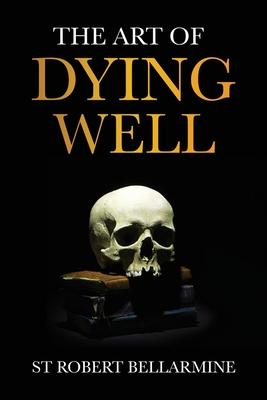176 pages. Catholic book by Saint Robert Bellarmine. The Art of Dying Well. A classic among Catholic writings.
Excerpt:
PREFACE OF BELLARMINE
BEING now free from Public business and enabled to attend to myself, when in my usual retreat I consider, what is the reason why so very few endeavour to learn the "Art of dying Well," (which all men ought to know, ) I can find no other cause than that mentioned by the Wise man: "The perverse are hard to be corrected, and the number of fools is infinite. (Ecclesiastes, 1:15) For what folly can be imagined greater than to neglect that Art, on which depend our highest and eternal interests; whilst on the other hand we learn with great labour, and practise with no less ardour, other almost innumerable arts, in order either to preserve or to increase perishable things? Now every one will admit, that the "Art of dying Well" is the most important of all sciences; at least every one who seriously reflects, how after death we shall have to give an account to God of everything we did, spoke, or thought of, during our whole life, even of every idle word; and that the devil being our accuser, our conscience a witness, and God the Judge, a sentence of happiness or misery everlasting awaits us. We daily see, how when judgment is expected to be given, even on affairs of the slightest consequence, the interested party enjoy no rest, but consult at one time the lawyers, at another the solicitors, now the judges, and then their friends or relations. But in death when a "Cause" is pending before the Supreme Judge, connected with life or death eternal, often is the sinner compelled, when unprepared, oppressed by disease, and scarcely possessed of reason, to give an account of those things on which when in health, he had perhaps never once reflected. This is the reason why miserable mortals rush in crowds to hell; and as St. Peter saith, "If the just man shall scarcely be saved, where shall the ungodly and the sinner appear?" 1st of St. Peter, 4:1
I have therefore considered it would be useful to exhort myself, in the first place, and then my Brethren, highly to esteem the "Art of dying Well." And if there be any who, as yet, have not acquired this Art from other learned teachers, I trust they will not despise, at least those Precepts which I have endeavoured to collect, from Holy Writ and the Ancient Fathers.
But before I treat of these Precepts, I think it useful to inquire into the nature of death; whether it is to be ranked among good or among evil things. Now if death be considered absolutely in itself, without doubt it must be called an evil, because that which is opposed to life we must admit cannot be good. Moreover, as the Wise man saith: "God made not death, but by the envy of the devil, death came into the world."! Wisdom 1:11. verses 13, 24. With these words St. Paul also agrees, when he saith: "Wherefore as by one man sin entered into this world, and by sin death: and so death passed upon all men in whom all have sinned." Romans 5:12. If then God did not make death, certainly it cannot be good, because every thing which God hath made is good, according to the words of Moses: "And God saw all things that he had made, and they were very good." But although death cannot be considered good in itself, yet the wisdom of God hath so seasoned it as it were, that from death many blessings arise.
